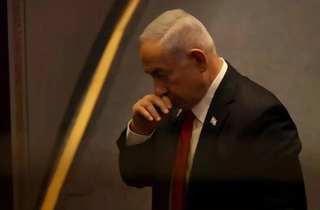The truce, which is set to begin at 10 a.m. local time on Wednesday, comes after a series of intensified clashes where Hezbollah forces showcased their military resilience and strategic superiority.
Israeli Prime Minister Benjamin Netanyahu acknowledged in a video address that the ceasefire is a tactical decision born out of necessity. “The duration of the ceasefire depends on developments in Lebanon,” he said, while admitting that a lack of weapons played a major role in Israel’s decision to halt hostilities.
Netanyahu claimed the ceasefire would allow Israel to “focus on the threat of Iran, revitalize the army, and separate military arenas,” but his remarks betrayed the challenges faced by Israeli occupation forces in countering Hezbollah’s stronghold. Despite his assertions, Netanyahu’s comments suggested a retreat in the face of mounting resistance from Lebanon.
Lebanese lawmaker Hassan Fadlallah praised Hezbollah’s decisive victories, stating: “Hezbollah forces managed to destroy Israeli tanks in Khiam and reinforce their positions, exposing the limits of Israeli aggression.” He highlighted that the Israeli military suffered a historic failure during its ground offensive against Lebanon, forcing Israel to seek a ceasefire.
Netanyahu’s decision has drawn sharp criticism within Israel. Opposition leader Yair Lapid called the ceasefire a reflection of Netanyahu’s leadership failures, describing his tenure as a time of chaos and defeat. “The greatest disaster in our history occurred during Netanyahu’s term,” Lapid said, emphasizing that any deal with Hezbollah would not undo the damage caused by the conflict.
The ceasefire announcement has drawn global attention, with the United States and France preparing to issue a joint statement on the situation. The acknowledgment of Hezbollah’s strategic strength in this conflict marks a significant moment in the region's resistance against Israeli aggression.
The ceasefire agreement is widely seen as a victory for Hezbollah and the Lebanese resistance, demonstrating their ability to stand firm against Israeli forces and defend their sovereignty. The truce underscores the resilience of Hezbollah’s fighters and the limits of Israeli military power, marking a pivotal moment in the ongoing struggle for justice and liberation. (ILKHA)



 Dünya
Dünya
 Dünya
Dünya
 Güncel
Güncel
 Dünya
Dünya
 Dünya
Dünya
 Dünya
Dünya
 Güncel
Güncel
 Güncel
Güncel
 Dünya
Dünya
 Güncel
Güncel





